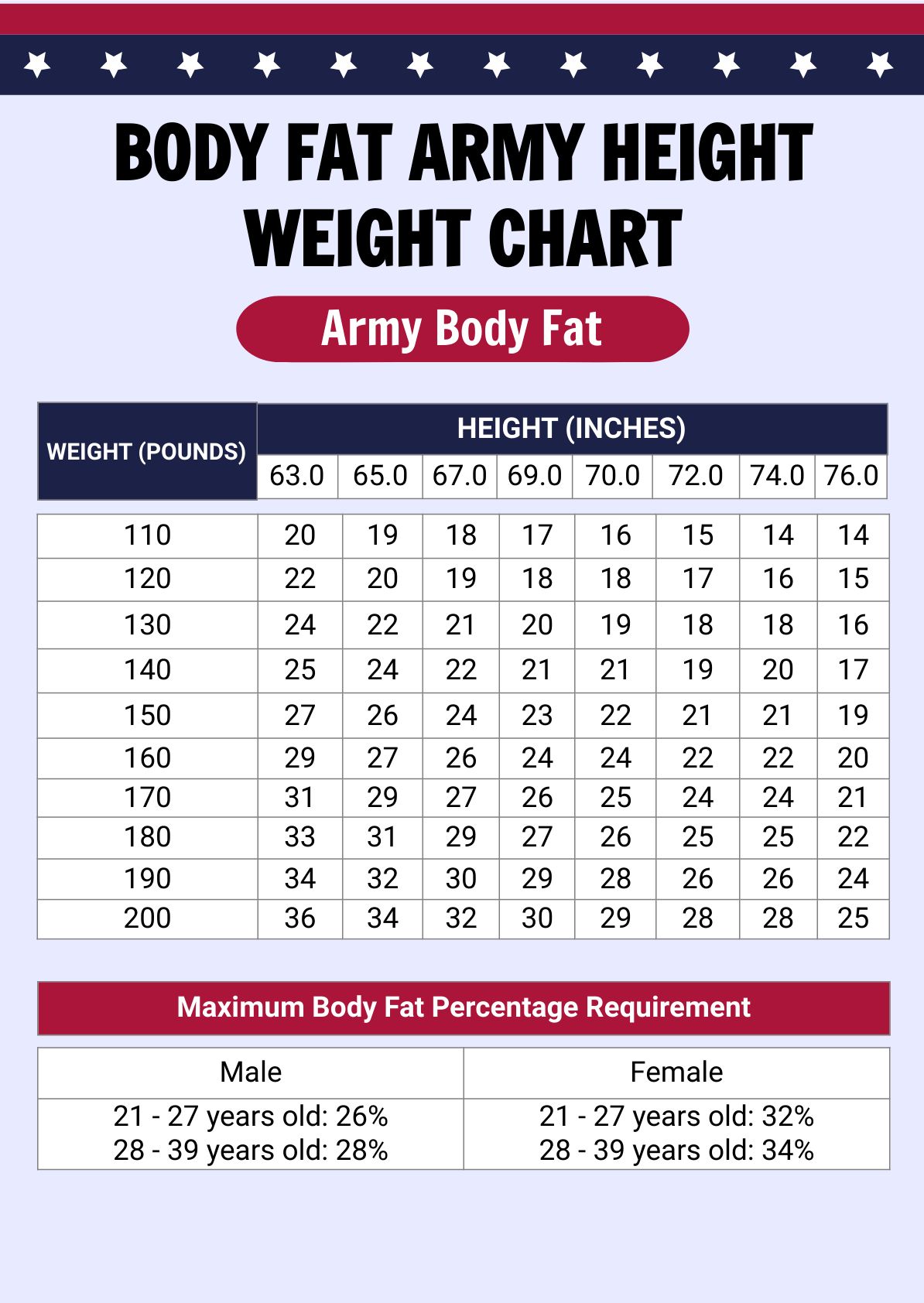Army weight requirements are a crucial aspect of military service that often goes unnoticed by the general public. These requirements ensure that all personnel maintain a level of physical fitness necessary for the demanding nature of military operations. In this article, we will explore the various factors that affect army weight requirements, including age, gender, and body composition, as well as the implications of these standards on service members' careers.
The military's weight requirements are not just arbitrary numbers; they are based on extensive research and analysis of what constitutes a healthy and capable soldier. This article aims to provide a thorough understanding of these requirements, the methods used to measure them, and the potential consequences for those who fail to meet the standards. By the end, readers will have a clearer picture of how weight requirements impact military readiness and individual service members.
Furthermore, we will discuss tips and strategies for maintaining a healthy weight and improving physical fitness, which are essential for anyone considering a career in the armed forces. Whether you are a prospective recruit or simply interested in military standards, this guide will equip you with the knowledge you need.
Table of Contents
- 1. Army Weight Standards
- 2. Factors Affecting Weight Requirements
- 3. Understanding Body Composition
- 4. Methods of Measurement
- 5. Consequences of Not Meeting Standards
- 6. Tips for Maintaining a Healthy Weight
- 7. Resources and Support
- 8. Conclusion
1. Army Weight Standards
The Army has specific weight standards that vary based on age and gender. These standards are established to ensure that all soldiers can perform their duties effectively and safely. Below are the key points regarding the army weight standards:
- Weight standards are outlined in Army Regulation 600-9.
- Each soldier is required to weigh in at least once a year.
- Standards differ for males and females, reflecting physiological differences.
- There are maximum allowable weights based on height.
2. Factors Affecting Weight Requirements
Several factors influence the weight requirements for army personnel. Understanding these factors can help individuals better prepare for their military service. Key factors include:
2.1 Age
Age plays a significant role in determining weight standards, as metabolic rates and physical capabilities can change over time.
2.2 Gender
Gender differences are acknowledged in the army weight standards, with separate regulations for men and women to account for physiological variances.
3. Understanding Body Composition
Body composition refers to the ratio of fat to lean mass in the body. The army places a strong emphasis on body composition rather than just weight alone. Here’s why:
- Body composition provides a more accurate assessment of fitness.
- Soldiers are encouraged to maintain a healthy ratio of muscle to fat.
- Excess body fat may affect performance and health.
4. Methods of Measurement
The army employs several methods to measure weight and body composition, including:
- Scale measurements for weight.
- Body fat percentage calculations using calipers or bioelectrical impedance.
- Height measurements to determine weight categories.
5. Consequences of Not Meeting Standards
Failing to meet army weight requirements can have serious implications for service members, including:
- Ineligibility for promotions and career advancement.
- Potential for being placed on a weight control program.
- Risk of separation from service if standards are not met.
6. Tips for Maintaining a Healthy Weight
Maintaining a healthy weight is crucial for success in the army. Here are some effective strategies:
- Engage in regular exercise, including cardio and strength training.
- Follow a balanced diet rich in whole foods.
- Stay hydrated and limit processed foods.
- Seek guidance from fitness professionals if needed.
7. Resources and Support
The army provides various resources to help service members meet weight requirements, including:
- Access to fitness programs and personal trainers.
- Nutritional counseling and meal planning.
- Support groups for accountability and motivation.
8. Conclusion
In summary, army weight requirements are vital for maintaining military readiness and ensuring service members can perform their duties effectively. By understanding these standards and the factors influencing them, individuals can better prepare for a career in the armed forces. It is essential to prioritize health and fitness to meet and exceed these standards. If you have any questions or comments, please feel free to share your thoughts or experiences below!
We hope you found this article informative and helpful. For more insights on military standards and fitness, be sure to check out our other articles and resources!
You Might Also Like
Exploring The Life And Career Of Argemiro Escobar: A Notable Figure In Colombian History@mobilecreativeorg: A Comprehensive Guide To Mobile Creativity
Niki Richard Dalgliesh Cavill: A Deep Dive Into The Life And Career Of The Celebrated Actor
Aina Asif Age: Exploring The Life And Career Of The Rising Star
Liveomek: Revolutionizing Online Learning Experience
Article Recommendations


